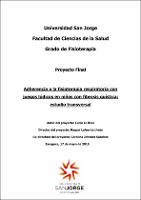Por favor, use este identificador para citar o enlazar este ítem:
https://repositorio.usj.es/handle/123456789/210
Registro completo de metadatos
| Campo DC | Valor | Lengua/Idioma |
|---|---|---|
| dc.contributor.advisor | Lafuente Ureta, Raquel | - |
| dc.contributor.advisor | Jiménez Sánchez, Carolina | - |
| dc.contributor.author | Le Bras, Lucie Rosanna | - |
| dc.date.accessioned | 2019-07-19T10:03:07Z | - |
| dc.date.available | 2019-07-19T10:03:07Z | - |
| dc.date.issued | 2019 | - |
| dc.date.submitted | 2019-05-03 | - |
| dc.identifier.uri | https://repositorio.usj.es/handle/123456789/210 | - |
| dc.description | Introduction and objective: Adherence to therapy respiratory is difficult to sustain in children with Cystic Fibrosis (CF). Therapeutic games make physiotherapy more recreational and have promising results in the improvement of clinical outcomes. The objective of this study is to assess the impact of an activity of Service Learning (ASL) in the perception of ludic aspect and physiotherapy’s adherence in the population of fathers’ children with CF. Methods: A descriptive cross-sectional study was carried out. Seven partners of the Aragonese Association of Cystic Fibrosis were present the day of the Activity of Learning Service. Health education (physiopathology, physiotherapy action, impact of therapeutic games, importance of sport) and elaboration of nine therapeutic breathing games were included. Sociodemographic data of the progenitors dans children, the pattern of the illness, the type of a physiotherapy’s session, degree of adhesion and ludic aspect, and satisfaction degree of the fathers were assessed through the questionnaire given to the parents at the end of the ASL. Results: Every child realize respiratory therapy at home, which average 168 minutes of treatment weekly for the whole group, but a session is not pleasant for the child. After the ASL, fathers consider that therapeutic games make more pleasant a session and may result helpful to improve home therapy’s adherence. Conclusion: The study shows that the ASL have an impact in the fathers’ way of thinking and raise consciousness that therapeutic games can help to improve children’s adherence to the treatment. | es_ES |
| dc.description.abstract | Introducción y objetivo: Los niños con Fibrosis Quística (FQ) tienen baja adherencia a la fisioterapia respiratoria. Los juegos enfocados a la salud hacen más divertida esta, y tienen resultados prometedores en el ámbito clínico. El objetivo de este estudio es evaluar el impacto de una Actividad de Aprendizaje y Servicios (ApS) sobre la percepción del aspecto lúdico y la adherencia a la fisioterapia en los padres de niños con fibrosis quística. Metodología: Se realizó un estudio transversal descriptivo. Siete pacientes de la Asociación Aragonesa de Fibrosis Quística se presentaron en la Actividad de ApS. Consistió en una charla educativa y una parte práctica de elaboración de nueve juegos artesanales para favorecer el soplido. Se valoraron los datos sociodemográficos de los progenitores y de los niños, las características de la enfermedad, el tipo de sesiones de fisioterapia respiratoria, el grado de adherencia y del aspecto lúdico a fisioterapia, y el grado de satisfacción de los padres en cuanto a la actividad mediante un cuestionario distribuido al final de la actividad. Resultados: A todos los niños que realizaron fisioterapia respiratoria en casa, con una media de 168 minutos por semana, no les resulto amena. Después de la ApS, los padres consideran que los juegos respiratorios pueden resultar útiles, que la sesión va a ser más lúdica con ellos, y así va a mejorar la adherencia a la fisioterapia en casa. Conclusión: De manera global, el estudio muestra el impacto de un taller educativo sobre lo que piensan lo padres, haciéndoles conscientes de la importancia de incluir los juegos lúdicos en el tratamiento. | es_ES |
| dc.format.extent | 33 p. | es_ES |
| dc.format.mimetype | application/pdf | es_ES |
| dc.language.iso | spa | es_ES |
| dc.rights | Attribution-NonCommercial-NoDerivatives 4.0 Internacional | * |
| dc.rights.uri | http://creativecommons.org/licenses/by-nc-nd/4.0/ | * |
| dc.subject | Fibrosis quística | es_ES |
| dc.subject | Niños | es_ES |
| dc.subject | Adherencia | es_ES |
| dc.subject | Terapia respiratoria | es_ES |
| dc.subject | Juegos terapéuticos | es_ES |
| dc.title | Adherencia a la fisioterapia respiratoria con juegos lúdicos en niños con fibrosis quística: estudio transversal | es_ES |
| dc.type | info:eu-repo/semantics/bachelorThesis | es_ES |
| dc.rights.accessrights | info:eu-repo/semantics/openAccess | es_ES |
| Aparece en las colecciones: | Grado en Fisioterapia | |
Ficheros en este ítem:
| Fichero | Descripción | Tamaño | Formato | |
|---|---|---|---|---|
| Adherencia a la fisioterapia respiratoria con juegos.pdf | 899,9 kB | Adobe PDF |  Visualizar/Abrir |
Este ítem está sujeto a una licencia Creative Commons Licencia Creative Commons

